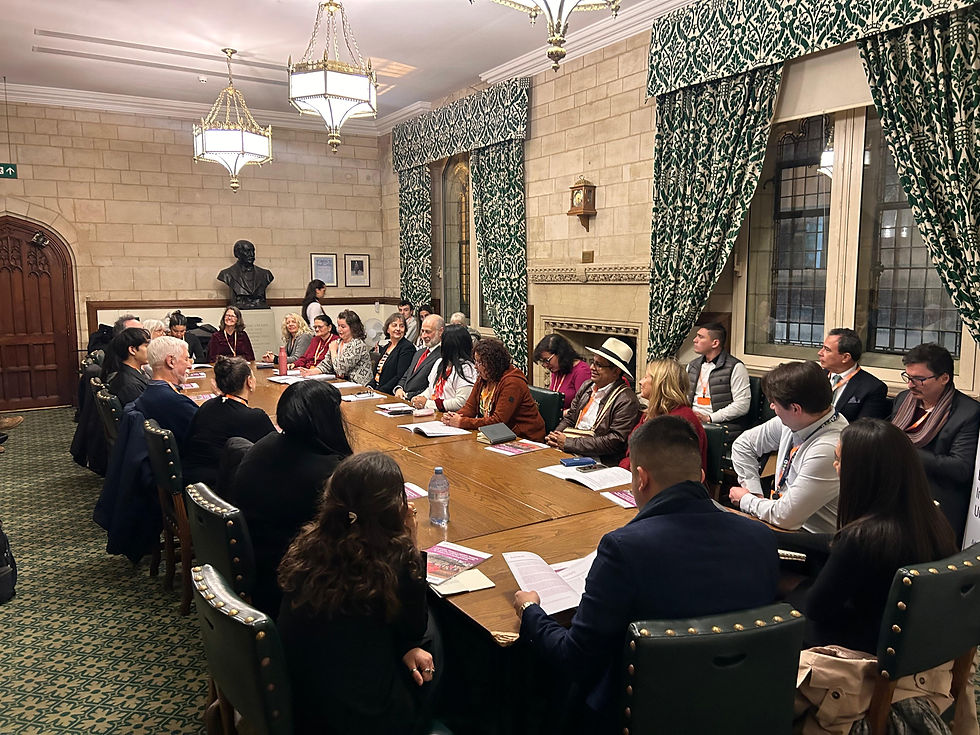Colombia: Women and Violence - Roundtable and Report Launch
- goffej
- Nov 26, 2024
- 3 min read
Colombia: Women and Violence:
Its Causes and Consequences
to mark the International Day for the Elimination of Violence Against Women
Roundtable and Report Launch
26.11.24
In attendance:
Tess Phippen – Head of Women, Peace and Security at FCDO (speaker)
Edilma Loperena Plata – Women’s Commissioner of the Wiwa Yugumaium Bunkuanarrua Tayrona Organisation (speaker)
Jenny Ortiz – HRs and Intercultural Programme leader at CINEP (speaker)
Louise Winstanley – Programme and Advocacy Manager at ABColombia (speaker)
Invited officials, NGO and CSO representatives
Chair: Fabian Hamilton MP – PHRG Chair and Chair of British Group of the Inter-Parliamentary Union (BGIPU)
Summary:
The event featured a Parliamentary launch of ABColombia’s report on Colombia: Violence against Women, Girls and the LGBTQI+ Community: Its Causes and Consequences, dedicated to courageous WHRDs working at the grassroots, such as Edilma and Jenny, and testimony from the latter about their work and the situation on the ground for women and girls (W&G) in Colombia.
Main Points:
Fabian Hamilton MP opened by noting the prevalent and pervasive nature of Gender-Based Violence (GBV), and the rise of femicide globally, and highlighted:
The need to realise the right of women to live, and to live free of violence and discrimination, was urgent.
Women in Colombia, particularly those from minority communities, face a heightened risk of GBV because of their political and economic marginalisation and persecution, and their commitment to the defence of environmental and cultural rights.
Women in Colombia are targeted by a wide range of actors, and working towards bringing the perpetrators to account, to break the long-standing cycles of impunity, which often results in further violence.
Tess Phippen stressed that the FCDO has prioritised the empowerment of W&G, and pushes for the integration of WPS language at the UN and the participation of W&G in ceasefire negotiations and other related forums. She also noted inter alia:
The UK supported Colombia in the drafting of its National Action Plan 1325, and had designated Colombia as a focus country in its own NAP 1325.
Lord Collins, FCDO Minister for Human Rights, has been designated HMG’s PSVI champion.
The UK chaired the first High-Level meeting of the International Alliance on PSVI, and Colombia is Alliance Chair for 2024.
UK funding has helped support victims of GBV, including to access justice.
Edilma Loperena Plata first stated that the most powerful weapon used against W&G is GBV, and that those who have been targeted largely remain silent. In addition:
A pathway for prevention and follow-up with regards to GBV is needed.
Those defending women and their rights face many threats, and she herself has been a victim of violence.
Men also need to be brought on board and to listen to women’s experiences.
Jenny Ortiz explained that GBV was systematic, and manifested itself in multiple ways, including sexual violence, domestic violence, and trafficking, with multiple perpetrators involved. Also:
Victims often cannot obtain justice because the perpetrators have powerful ties and positions.
Providing safe spaces for women to speak and expressing solidarity for victims seeking justice is important.
Louise Winstanley highlighted that Colombia was the most dangerous country in the world for HRDs, particularly women in leadership positions, and made the following points:
Discriminatory systems, and norms of masculinity, fuel GBV and entrench the impunity of perpetrators of GBV, while feminisation of poverty has also resulted in cycles of victimisation.
The full truth of what happened in the conflict, including as regards W&G, is not yet known, but there are numerous on-going efforts to effect change, including with Macro-case 11, which is focused on the prosecution of sexual violence and crimes based on gender, sexual orientation, and gender identity.
Access to justice is very difficult, however, with barriers including state collusion, lack of protocols and societal prejudice.
Reparations to promote respect for women’s rights are also needed.
Women who engage in activism face immense risks to their own lives, as well as the safety of their families and territories.
This is one of the Report’s central findings: “Despite threats to their lives, women in Colombia are determined to build peace. They are not victims, they are active agents of change.”
The UK is called on to:
prioritise GBV generally in Colombia, not just GBV in conflict;
promote grassroots and indigenous-led initiatives to empower women and marginalised groups;
support the creation of women’s commissions in indigenous communities;
support CSOs’ monitoring of the implementation of Colombia’s NAP 1325;
advocate for dismantling criminal groups and strengthening justice mechanisms to combat impunity.
The PHRG is committed to supporting NGOs working in and on Colombia, and Colombian WHRDs, by raising awareness of their concerns and needs in Parliament, with Government and more widely, and closely monitoring progress on the implementation of the 2016 Peace Accord.



